Related Research Articles

Fiji has experienced many coups recently, in 1987, 2000, and 2006. Fiji has been suspended various times from the Commonwealth of Nations, a grouping of mostly former British colonies. It was readmitted to the Commonwealth in December 2001, following the parliamentary election held to restore democracy in September that year, and has been suspended again because of the 2006 coup, but has been readmitted a second time after the 2014 election. Other Pacific Island governments have generally been sympathetic to Fiji's internal political problems and have declined to take public positions.

Politics of Solomon Islands takes place within the framework of a parliamentary representative democratic, constitutional monarchy. Solomon Islands is an independent Commonwealth realm, where executive power is exercised by the government. Legislative power is vested in both the government and a multi-party parliament.

The foreign policy of Solomon Islands as of 2008 was described by the Solomon Islands government as a "look north" policy, aimed as strengthening diplomatic and economic relations with Asian countries for development purposes.

Andrew Dawson, usually known as Anderson Dawson, was an Australian politician and unionist who served as the 14th premier of Queensland for one week from the 1 to the 7 of December 1899. This short-lived premiership was the first Australian Labor Party (ALP) government in Australia and the first parliamentary labour party government anywhere in the world.

Vaiben Louis Solomon was the 21st Premier of South Australia and a member of the first Australian Commonwealth parliament. He was generally known by his full name.

Sir Frederick William Holder was an Australian politician who served as the first speaker of the Australian House of Representatives from 1901 to 1909. A member of the Free Trade Party and later an independent, he served twice as the 19th premier of South Australia from June to October 1892 and again from 1899 to 1901. He was a prominent member of federation movement and the first Parliament of Australia, following Federation in 1901.

Egerton Lee Batchelor was an Australian politician and trade unionist. He was a pioneer of the Australian Labor Party (ALP) in South Australia, which at the time was known as the United Labor Party (ULP). He was a member of the South Australian House of Assembly (1893–1901), leading the ULP from 1898 until his resignation in 1899 to accept a ministerial post in a non-Labor government, with the party's approval. Batchelor entered federal politics in 1901 and held cabinet posts in the first three ALP governments. He was Minister for Home Affairs (1904) under Chris Watson, and then served two terms as Minister for External Affairs under Andrew Fisher. He suffered a fatal heart attack at the age of 46 while climbing Mount Donna Buang.
The following lists events that happened during 1899 in Australia.
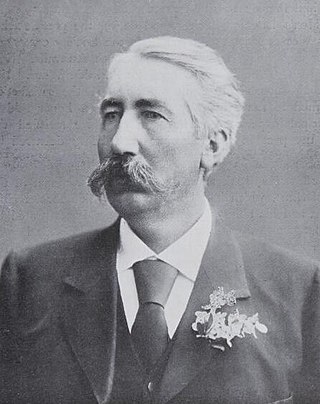
John Greeley Jenkins was an American-Australian politician. He was Premier of South Australia from 1901 to 1905. He had previously served as Minister for Education and the Northern Territory and Commissioner for Public Works under Thomas Playford II, Commissioner of Public Works under Charles Kingston and Chief Secretary under Frederick Holder. He was subsequently Agent-General for South Australia from 1905 to 1908.

Sir John Hannah Gordon KC was a Scottish-Australian politician and judge. He was a member of the South Australian Legislative Council from 1888 to 1892 and from 1893 to 1903. He was a minister under four Premiers: John Cockburn, Frederick Holder, Charles Kingston and John Jenkins, variously as Minister for Education, Chief Secretary, Attorney-General, and Minister Controlling the Northern Territory. He was a judge of the Supreme Court of South Australia from 1903.
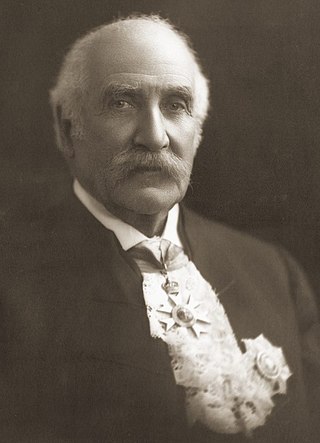
Sir John Lancelot Stirling,, generally known as Sir Lancelot Stirling, was an Australian politician and grazier. He was a member of the South Australian House of Assembly from 1881 to 1887, representing Mount Barker, and 1888 to 1890, representing Gumeracha. He was then a member of the South Australian Legislative Council from 1891 to 1932, representing the Southern District. He was President of the Legislative Council from 1901 to 1932 and was Chief Secretary in the seven-day Solomon Ministry of 1899.
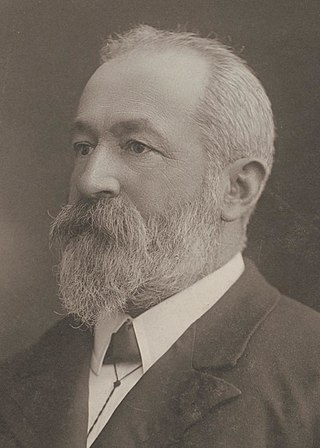
Richard Witty Foster was an Australian politician. He began his career in the Parliament of South Australia (1893–1906) and served two terms as Commissioner of Public Works in liberal and conservative governments. He was elected to federal parliament in 1909 as a Liberal, later joining the Nationalists. He was Minister for Works and Railways (1921–1923) under Prime Minister Billy Hughes, eventually losing his seat at the 1928 election.
The Carpenter Ministry was the 34th Ministry of the Government of Western Australia, and was led by Labor Premier Alan Carpenter and his deputy Eric Ripper. It succeeded the Gallop Ministry on 3 February 2006 due to the retirement of Dr Geoff Gallop from politics on 25 January, and was in turn succeeded by the Barnett Ministry on 23 September 2008 after the Labor Party lost government at the state election held on 6 September.

The 1899 South Australian colonial election was held on 29 April 1899 to elect all 54 seats in the South Australian House of Assembly. In the seat of Albert, the incumbent members were elected unopposed on 12 April, and the election in the seat of Northern Territory was held on 6 May. All 54 seats in the South Australian House of Assembly were up for election. The incumbent liberal government led by Premier of South Australia Charles Kingston in an informal coalition United Labor Party (ULP) led by Lee Batchelor defeated the conservative opposition led by Leader of the Opposition John Downer. Each district elected multiple members, with voters casting multiple votes. Although the conservatives won more seats, the liberal government retained power until later that year, when new conservative leader Vaiben Louis Solomon forced the government to resign, but only held office for one week. The liberals held government until the next election through leaders Frederick Holder and John Jenkins.
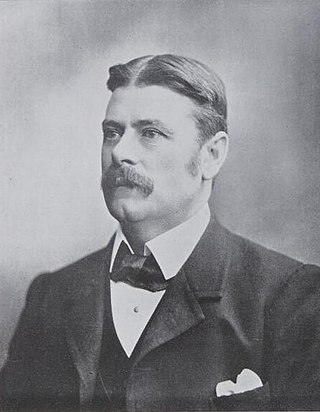
The 1902 South Australian state election was held on 3 May 1902 following the dissolution of both houses. All 42 seats in the South Australian House of Assembly were up for election, and all 18 seats in the Legislative Council. The House had a reduction of 12 seats compared to the previous election. The Council was reduced from 6 members in each of four districts to 6 members from Central District and four from each of North-Eastern, Northern and Southern Districts. The incumbent liberal government led by Premier of South Australia John Jenkins in an informal coalition with the conservatives defeated the United Labor Party (ULP) led by Thomas Price. Each of the 13 districts elected multiple members, with voters casting multiple votes.
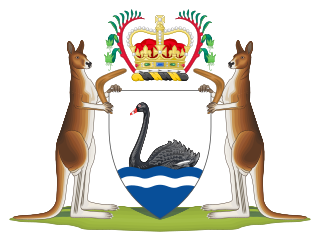
The Minister for Education and Training is the member of the Government of Western Australia responsible for maintenance and improvement of Western Australia's system of education, and is answerable to the Parliament for all actions taken by the Department of Education under their authority. The holder of the office is usually an elected member of parliament from the ruling party or coalition, presently Tony Buti of the Labor Party.

Visitors to Chile must obtain a visa from one of the Chilean diplomatic missions unless they come from one of the visa exempt countries.

The British Overseas Territories maintain their own entry requirements different from the visa policy of the United Kingdom. As a general rule, British citizens do not have automatic right of abode in these territories.
This is a list of members of the South Australian House of Assembly from 1899 to 1902, as elected at the 1899 colonial election:

The Second Holder ministry was the 42nd ministry of the Government of South Australia, led by Frederick Holder. It commenced on 8 December 1899, following the defeat of the seven-day Solomon ministry. It was succeeded by the Jenkins ministry on 15 May 1901, following Holder's retirement from state politics to enter federal politics, and his replacement as leader of the liberal faction in parliament by his Chief Secretary, John Jenkins.
References
- ↑ "Statistical Record of the Legislature, 1836-2009" (PDF). Parliament of South Australia. Retrieved 19 September 2015.